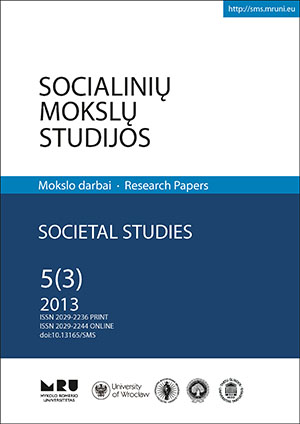Agrarinis lobizmas Europos Sąjungoje ir Lietuvoje
Agrolobbyism in EU and Lithuania
Author(s): Linas Jonas Gustas, Vygandas PaulikasSubject(s): Social Sciences
Published by: Mykolas Romeris University
Keywords: pluralism; corporatism; clientelism; agrolobbyism; Lithuanian agricultural interest groups; European Commision; European Parlament; European Council; Lithuania; interests
Summary/Abstract: Lobbying activities of Lithuanian agricultural interest groups in European and Lithuanian institutions are described in this paper. Lobbying activities of Lithuanian agricultural interest groups have elements of pluralism and corporatism, but elements of corporatism are more numerous. Also, this paper touches upon lobbying activities in the European Commision, the European Parliament and the European Council. Leaders of Lithuanian agricultural interest groups and Lithuanian statesmen were interviewed about interests, lobbyism method effectiveness, access points of Lithuanian agricultural groups and of competitive interest groups. A comparative analysis of the answers of the Lithuanian agricultural group leaders and the Lithuanian statesmen was made. The paper presents conclusions of the above analysis. Lithuanian state officials and politicians which took part in the research interviews stated that the most influential Common Agriculture Policy formers are officials of European Commision and officials of national agricultural ministries. The most influential shapers of Lithuanian farmers` position are top officials in the Chamber of Agriculture of the Republic of Lithuania and leaders of national farmers’ organisations. They plan and execute lobbying activities in Lithuania and Brussels. Lithuanian farmers` lobbying activities in European Union institutions is weak, but Lithuanian farmers are able to form their position and to defend it. Lithuanian agricultural organisations, except Lithuanian Forest Owners Association, are not registered in European Union Transparency Register. Lithuanian agricultural organisations do not hire professional lobbyists in most cases. The basic methods of Lithuanian farmers` lobbying activities are expert information and campaigns of public opinion forming. In most cases Lithuanian farmers` leaders appeal to Lithuanian government institutions. To European Union institutions Lithuanian farmers appeal through mediators. Those mediators are Lithuanian state officials or European agricultural organisations. Lithuanian farmers rarely appeal to European Union institutions directly. In cases of direct address of EU institutionsLithuanian farmers ask for assistance of the European Parliament members from the Baltic States. Lithuanian farmers lack lobbying abilities. Only 10 percent of Lithuanian farmers participate in activities of agricultural organisations. Lithuanian farmers` lobbying methods sometimes are not suitable, for example, Lithuanian farmers insufficiently value influence of press campaigns to European Union institutions decisions. Also Lithuanian farmers hold a faulty opinion that Lithuanian state officials have more influence in Common Agriculture Policy forming than European Union institutions do. Lithuanian farmers did not achieve their main goal - to equalize direct payments to those of Western European countries. Lithuanian farmers` competitors are agricultural organisations from another European count
Journal: Socialinių mokslų studijos
- Issue Year: 5/2013
- Issue No: 3
- Page Range: 809-836
- Page Count: 28
- Language: Lithuanian

